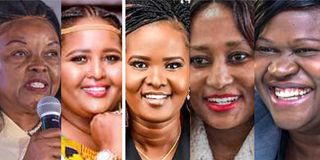Unfulfilled promise: Why we must act on gender equality in Kenyan politics

Machakos Senator Agnes Kavindu, Samburu West MP Naisula Lesuuda, Turkana Woman Rep Cecilia Asinyen Ngitit, Kirinyaga Woman Rep Jane Njeri Maina and Homa Bay Governor Gladys Wanga.
What you need to know:
- The two-thirds gender rule, enshrined in Articles 27(8) and 81(b), remains unfulfilled.
- It’s a promise we made to ourselves, to our daughters, and to the future of our nation.
As I pen this note, I’m struck by the resilience and determination of Kenyan women who dare to dream of political leadership. Their stories are both inspiring and sobering.
They remind us of how far we’ve come and how far we still have to go. The challenges are stark and multifaceted. Our Constitution promised a new dawn for gender equality, yet, over a decade later, we’re still grappling with its implementation.
The two-thirds gender rule, enshrined in Articles 27(8) and 81(b), remains unfulfilled. It’s a promise we made to ourselves, to our daughters, and to the future of our nation. We must ask ourselves: why have we failed to honour it? The answer lies partly in the deep-rooted obstacles that women face when considering a political career.
As explained in a book titled It takes a Candidate, women often put families and careers first, viewing politics as a daunting ‘third job.’
Many believe they’re not qualified, and crucially, they’re less likely to be recruited as candidates by political parties.
But the barriers don’t stop there. The silencing of women through normalised gender-based violence (GBV) is a grim reality. I’ve heard from women who’ve refused media appearances because harassment spikes after they’ve been in the news.
The misogynistic nature of online abuse, from sexist name-calling to threats of rape and death, is a form of GBV that deters political participation.
Economic factors play a significant role too. Women face specific financial challenges at various stages of their political careers. They’re often reluctant to invest family resources they don’t feel they individually own, or to risk their family’s capital.
But I’m not writing to dwell on these challenges. I’m writing because I see hope. I see solutions. And I believe that together, we can transform the landscape of Kenyan politics.
Look at Rwanda, our neighbour. In 2003, they introduced a constitutional quota mandating 30 per cent women’s representation in all decision-making organs.
Today, it boasts the highest percentage of women parliamentarians globally at 61.3 per cent. Their journey proves that with political will and the right policies, change is possible.
Indeed, gender quotas have shown to be effective globally. Countries with legislated candidate quotas have seen women’s representation increase. It’s a powerful tool we must consider.
Here in Kenya, we have the frameworks. The Political Parties Act of 2011, amended in 2016, requires parties to ensure that not more than two-thirds of their registered office bearers are of the same gender. It’s a start, but we need to go further.
We need to demand that parties not only meet this requirement but actively recruit and promote women candidates in winnable seats. The National Gender and Equality Commission has been pushing for the enactment of the two-thirds gender rule. Their efforts, combined with those of civil society, are creating pressure for change. But pressure isn’t enough. We need action.
So, what can we do? First, we must push for campaign finance reform. The high cost of elections is a significant barrier for women. By capping spending and providing public funding, we can level the playing field.
We must also support and expand initiatives like the UN Women’s “Expanding Spaces for Women Political Participation in Kenya” project, which provides crucial training and networking opportunities for aspiring women leaders.
But change isn’t just about policy; it’s about perception and safety. We need to challenge our media to provide fair and balanced coverage of women candidates and take a stand against online harassment. As a society, we must confront and change the attitudes that normalise GBV in politics.
Public education is key. We need to raise awareness of the importance of women’s political participation and the unique perspectives they bring to decision-making.
In our communities, we can actively support women leaders by attending their rallies, volunteering for their campaigns, and amplifying their voices.
Support from male allies is also crucial. When we exclude women from political leadership, we rob ourselves of half our talent pool, half our perspectives, and half our potential solutions.
As we look towards 2027, let’s not just hope for change – let’s create it.





